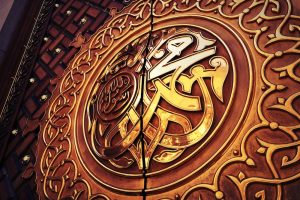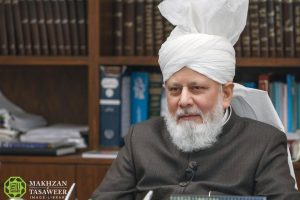
Hammad Ahmad, USA
After many years, an elderly man finally has a son. Being granted a child after so many prayers, you can imagine the love and attachment this father must have had for his son. You can also then imagine how heart-wrenching it must have been when that very Lord Who granted him this son in answer to his prayers, commanded him to abandon his young son and wife in the barren wilderness of the deserts of Arabia. Yet no matter how confusing and difficult this task was, the father slaughtered all his desires and emotions and did exactly as he was commanded. He slaughtered his inner self and was willing to make any sacrifice for his Lord.
Through the grace of God, the son and his mother not only survived but began to thrive in Arabia and established the town now known as Makkah. Fast forward a few years and you will see the father reuniting with this very son he was asked to abandon. Having already almost lost him once, you can imagine how much more love and attachment this father must have had for his son. You can also then imagine how much more heart-wrenching it must have been once again when that very Lord Who saved this son in the barren wilderness of the deserts of Arabia, commanded him once more to slaughter his son in a dream. This time the father tells his son the dream and asks his opinion. The son, a little older now, replies, ‘O my father, do as you are commanded; you will find me, if Allah please, of those who are patient.’ [1] Again, no matter how confusing and difficult the task, both father and son slaughtered all their desires and emotions and did exactly as they were commanded. They slaughtered their inner selves and were willing to make the ultimate sacrifice for their Lord.
Just as the father was about to slaughter his son, God spoke to him once more and said, ‘O Abraham, you have indeed fulfilled the dream.’ [2] God accepted their sacrifice and commanded them to slaughter a ram instead and distribute its meat.
This was the story of the prophets Abraham (as) and Ishmael (as). Every year on Eid al-Adha – the Festival of Sacrifice – Muslims all over the world commemorate this story by slaughtering a goat, sheep, cow, or camel and distributing its meat in memory of the sacrifice of the prophets Abraham (as) and Ishmael (as).
But is this really all Eid al-Adha is about? Are we really just celebrating the slaughter of an animal by slaughtering more animals? After all, the Qur`an does say, ‘Their flesh reaches not Allah, nor does their blood, but it is your righteousness that reaches Him.’ [3] So what exactly are we celebrating this day? What sacrifice are we actually commemorating? And what are we really supposed to be slaughtering?
Take a deeper look at these historical events and you will realize the real sacrifice we are commemorating is not the slaughter of a physical animal, but of the animal within. It is the slaughtering of our egos, passions, and desires for the sake of God – the way Abraham (as) and Ishmael (as) slaughtered their inner selves, their passions, and their desires for the sake of God. It is the sacrifice of devoting ourselves to obeying every command of God for His pleasure – the way the prophets Abraham (as) and Ishmael (as) devoted themselves to obeying every command of God for His pleasure, even at the cost of their own life. This is the slaughter we celebrate on Eid al-Adha. This is the reality of the dream of Prophet Abraham (as).
Yet the truest fulfilment of this dream did not occur in the life of the prophet Abraham (as) or even Ishmael (as), but occurred much later in one of their descendants. The real embodiment of this dream came in the person of the Holy Prophet Muhammad (sa). He was that person who sacrificed anything and everything possible for the sake of God. The way he slaughtered his inner self and devoted himself to God is unparalleled in history. His nights were for God. His days were for God. Every living, breathing, waking, and even sleeping moment was spent for the sake of God. Every ounce of expendable energy was sacrificed for the sake of God. He may not have been ‘killed’ in the way of God, but he lived and gave his entire life purely for the sake of God – and thus became the greatest example of sacrifice in human history. He was that ‘great sacrifice’ that God says through which ‘He ransomed Ishmael’ [4]. It was not the ram that ransomed Ishmael (as). Rather, Ishmael (as) was ransomed, and his life was spared only because of this Majestic Prophet (sa) who was destined to rise from the offspring of Ishmael (as) and become the actual fulfilment of that dream and greatest embodiment of sacrifice.

The Qur`an captures this essence of the Holy Prophet (sa) in the following words: ‘Say, “My prayer and my sacrifice and my life and my death are all for Allah, the Lord of the worlds.”’ [5] In fact, the Qur`an further refers beautifully to the extent to which the Prophet (sa) was willing to make these sacrifices: ‘Haply you will grieve yourself to death because they believe not.’ [6] In reality, this is what we truly celebrate on Eid al-Adha – the life of sacrifice of the Holy Prophet Muhammad (sa) that served as a ‘great ransom’ for the life of Prophet Ishmael (as).
But then the question arises – what have we done that is worthy of celebration on this day? What have we done to deserve happiness on this day? Is it enough to just claim to be followers of this Great Prophet (sa)? Shouldn’t we be following the great example of sacrifice established by this Prophet (sa) to earn this celebration and deserve this happiness? As the Qur`an says, ‘Say, ‘If you love Allah, follow me; then will Allah love you and forgive you your faults. And Allah is Most Forgiving, Merciful.’’[7]
Thus, on a deeper level, the festival of Eid al-Adha is a celebration of how much we have slaughtered our egos and inner animals. It is a celebration of how much we have sacrificed ourselves for the sake of Islam in accordance with the example of Prophet Muhammad (sa), who was the truest fulfilment of the dream of Prophet Abraham (as).
And in this dark age of Islam, [8] Hazrat Mirza Ghulam Ahmad (as), the Promised Messiah and Imam Mahdi and Founder of the Ahmadiyya Muslim Community, spells out exactly the kind of sacrifice the revival of Islam demands in these latter days: ‘The revival of Islam demands a ransom from us. What is that ransom? That ransom is to die in this pursuit. This is the death on which depends the revival of Islam, the revival of Muslims and the manifestation of the living God. This is the sacrifice which in other words is known as ‘Islam’. This is ‘Islam’ which God now intends to resuscitate.’ [9]
So, as we gather to commemorate Eid al-Adha this year, let us ask – have we earned this celebration by slaughtering the animal of our egos? Have we deserved this happiness by following the great example of sacrifice of the Prophet Muhammad (sa)? Have we made the sacrifices necessary for the revival of Islam in this era?
Have we sacrificed our emotions like the prophet Abraham (as), tearfully abandoning his young family in the wilderness of the deserts of Arabia at God’s behest? Or like the companion who leapt into battle immediately after his wedding, abandoning his new bride at home, only to give his life for the sake of Islam? [10]
Have we sacrificed our time for the sake of Islam like Hazrat Sa`d bin Abi Waqas (ra), who would spend almost his entire night awake guarding the tent of the Messenger of Allah (sa)?
Have we sacrificed our wealth for the sake of Islam like Hazrat Abu Bakr (ra), who would routinely give up everything he owned for the service of faith? Or like Hazrat Abu Hurairah (ra), who gave up every worldly means of support to become one of the Ashab al-Suffah, [11] dedicating his life to learning the religion?
These are the sacrifices that make Eid al-Adha truly worth celebrating.
If we answered yes to these questions, then this day is for us and we truly deserve this happiness. But if we answered no, then as we slaughter our physical animals to distribute their meat, let us make a pledge on this day that over the next year we will also slaughter the animal of our egos. That we will follow in the footsteps of prophets and companions by making these necessary sacrifices so that next Eid al-Adha brings a happiness we truly deserve. For even just making this firm commitment on this day can make this an Eid worth celebrating.
Eid Mubarak!

About the Author: Hammad Ahmad is a graduate from the Ahmadiyya Institute of Languages and Theology in Canada. He serves as an Imam of the Ahmadiyya Muslim Community USA, and serves the states of Georgia, South Carolina, and North Carolina.
ENDNOTES
[1] Holy Qur’an 37:103
[2] Holy Qur’an 37:105-106
[3] Holy Qur’an 22:38
[4] Holy Qur’an 37:108
[5] Holy Qur’an 6:163
[6] Holy Qur’an 26:4
[7] Holy Qur’an 3:32
[8] https://sunnah.com/mishkat:276 and https://sunnah.com/bukhari:4897
[9] Victory of Islam, p. 10, (Translation of Fat-he-Islam) by Hazrat Mirza Ghulam Ahmad, The Promised Messiah and Mahdi (as)
[10] https://www.alhakam.org/the-exemplary-young-companions-passion-for-jihad-in-the-way-of-allah/
[11] “Companions of the Veranda” – those companions who had abandoned all worldly support to dedicate their lives for Islam and lived in the “Veranda” portion of the Prophet’s (sa) Mosque. See: https://www.alislam.org/library/articles/Ashab-us-Suffah-20080304MN.pdf




Add Comment